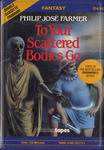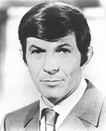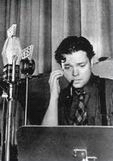
 Legends: Stories From The Masters of Fantasy: Volume 1
Legends: Stories From The Masters of Fantasy: Volume 1
Edited by Robert Silverberg; Read by Frank Muller and Sam Tsoutsouvas
4 Cassettes – Approx. 6 Hours [UNABRIDGED]
Publisher: Harper Audio
Published:
ISBN:
Themes: / Fantasy /
Robert Silverberg, himself a prolific fantasy author, has gathered with this series a collection of the longer novellas by the most popular living fantasy authors. Each of the authors was asked to write a new story based on one of his or her most famous series.
In Volume One there are two novellas. The first belongs to Stephen King and is set in his popular Gunslinger/Dark Tower universe. Silverberg’s contribution is set in his Majipoor universe. An intriguing premise but did it turn out to be any good?
The Dark Tower: The Little Sisters Of Eluria by Stephen King; Read by Frank Muller
Roland of Gilead, badly needs to find a horse doctor. His horse is ailing and won’t last long, but when he comes across a lonely desert town he quickly ends up needing a doctor for himself. Unfortunately, the only medical attention he’s getting comes from a vampire like sisterhood intent on both healing AND bloodletting.
I’ve never been overly fond of Stephen King, I find his writing like his ideas at best mildly interesting and at worst boring. But, being as I’d not tried anything of his work in some time, I was willing to give him another try. This piece seemed ideal. It was supposed to be fantasy, and not pure horror that he’s so well know for. It was also a prequel to a long series that I’d heard good things about (The Dark Tower series). But alas, I was not impressed in the least. While there are interesting elements, the setting is what appears to be a post-apocalyptic cross between the Zane Grey and The Road Warrior, which while not completely original is at least not a setting that has been done to death. Unfortunately the story is very long winded. I normally don’t care for overly long fantasy tales, The Lord of The Rings being a notable exception, but I am in the minority here. Stephen King fans don’t seem to mind a thicker than thick novel. This production of the Little Sisters of Eluria has the benefit of clarity, at all times I knew what was going on, and Frank Muller’s reading was okay, barring his usual difficulty with women’s voices. There are some writers who while not writing in the clearest manner manage to hold your attention by their very ideas. In the case of the Little Sisters Of Eluria, the clear writing and clear production just made the boredom more obvious for me. If you like the Dark Tower series you may enjoy this novella, but I found it a vulgar, mildly gross, hard to finish and ultimately pointless.
Majipoor: The Seventh Shrine by Robert Silverberg; Read by Sam Tsoutsouvas
Majipoor, a planet settled long ago by human colonists, is ruled by Valentine, once Lord Valentine now Pontifax of the whole planet. Valentine and his court entourage are on an expedition to an ancient city where they intend to investigate the murder of archeological team leader.
First let me say I like a lot of Silverberg’s work, some of his short stories are really good, but I’ve found his work very uneven. Being unfamiliar with the Majipoor stories I thought this novella would be a good introduction to Robert Silverberg’s fantasy series. This story though is a murder mystery, set on an alien world full of traditions and history. Silverberg does a fairly good job of bringing newbies like me up to speed, informing us of Pontifax Valentine’s personal history, and the strained species relations between the native Metamorphs (shapeshifting intelligent aliens) and the Human colonists of Majipoor. That being said, the story isn’t at all enthralling, it has a lot of “your majesty this” and “your majesty that” found in some of the more derivative fantasy fiction. The mystery element is unsolvable by the reader, something that I dislike as a general rule. But on the other hand Sam Tsoutsouvas does a good job, saving his different voices only for important plot characters. As with the other story in this audiobook, perhaps it will be more enjoyable for someone who likes the universe in which it is set. I can imagine never listening to another Majipoor story, and the idea doesn’t worry me in the least.
 Virtual Light
Virtual Light To Your Scattered Bodies Go
To Your Scattered Bodies Go Green Hills of Earth/Gentlemen Be Seated by Robert A. Heinlein, read by Leonard Nimoy, Caedmon, 1977
Green Hills of Earth/Gentlemen Be Seated by Robert A. Heinlein, read by Leonard Nimoy, Caedmon, 1977 I type that from memory, hearing Leonard Nimoy’s voice in my mind’s ear. These two stories make my favorites list probably for nostalgic reasons, though Leonard Nimoy is an excellent narrator. This was one of the first audiobooks I listened to as a youth – it was one of the tapes in my local library’s small collection. I found it one day while looking through the few old time radio cassettes. This was also my first exposure to Robert A. Heinlein, and I was hooked. I was struck (and still am) by Heinlein’s ability to make his future so normal to all the people in it.
I type that from memory, hearing Leonard Nimoy’s voice in my mind’s ear. These two stories make my favorites list probably for nostalgic reasons, though Leonard Nimoy is an excellent narrator. This was one of the first audiobooks I listened to as a youth – it was one of the tapes in my local library’s small collection. I found it one day while looking through the few old time radio cassettes. This was also my first exposure to Robert A. Heinlein, and I was hooked. I was struck (and still am) by Heinlein’s ability to make his future so normal to all the people in it. 
 War of the Worlds, Mercury Theater of the Air, 1938
War of the Worlds, Mercury Theater of the Air, 1938 The quality of the script and the convincing performances of Orson Welles and the actor who, as a newscaster, described the emergence of the Martians from a crater left when they landed in Grover’s Mill, New Jersey, make this one of my all-time favorite audio dramas.
The quality of the script and the convincing performances of Orson Welles and the actor who, as a newscaster, described the emergence of the Martians from a crater left when they landed in Grover’s Mill, New Jersey, make this one of my all-time favorite audio dramas.